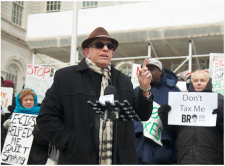
- Doctor Gilbert Ross speaks at a rally against new taxes on e-cigarettes. Photo credit: Jon Campbell
Last week, ACSH s Dr. Gilbert Ross spoke at a rally organized by New Yorkers for Smarter Smoking Alternatives (NYSSA), a coalition of local retailers, wholesalers and distributors as well as other members of the public who oppose the regulations on electronic cigarettes proposed by New York State lawmakers. Specifically, the rally last week was in opposition to proposals to tax electronic cigarettes as well as to ban their use in indoor spaces, as well as eliminating many flavors of e-cig liquids on the baseless conception that kid-friendly flavors will be overly appealing to youngsters.
According to NYSSA, "It is unreasonable to tax and regulate electronic cigarettes the same way as tobacco cigarettes. Electronic cigarettes are clearly distinct products and therefore should be regulated differently than traditional tobacco cigarettes."
Dr. Ross pointed out that "Politicians want to tax electronic cigarettes so they can prop up their budgets on the back of sick and dead smokers. He goes on to say that the actions of these politicians are only going to take electronic cigarettes away from smokers [who] desperately need them."
Taxes on nicotine-containing products should be commensurate with health risk and because e-cigarettes are far less risky than other tobacco products, the tax should take that into account. Scientific and empirical evidence should be used to recommend policies promoting tobacco harm reduction and e-cigarettes, and that evidence clearly shows that e-cigarettes are approximately 99% less hazardous than cigarettes, are consumed almost exclusively (i.e. > 99%) by smokers and former smokers who quit by switching to e-cigs, and have helped several million smokers quit and/or sharply reduce cigarette consumption. Treating electronic cigarettes as equivalent to tobacco products will simply relay the message to smokers that they should keep on smoking, resulting in almost a half a million dead American smokers each year.